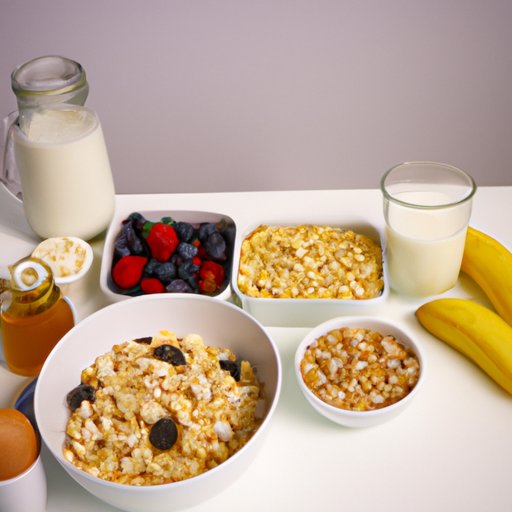Introduction
The idea of eating a healthy breakfast every day has become increasingly popular in recent years. But what is a truly healthy breakfast? Generally speaking, a healthy breakfast is one that includes a variety of nutrient-rich foods from all the major food groups, such as fruits, vegetables, grains, dairy, and proteins. The purpose of this article is to provide a comprehensive guide on how to eat a healthy breakfast every day, including what to include, how to make substitutions to accommodate dietary restrictions, what to look for when shopping, the benefits of eating a healthy breakfast, quick and easy recipes, and creative ideas for making it enjoyable.

A Comprehensive Guide to Eating a Healthy Breakfast
When it comes to eating a healthy breakfast, there are several key components to consider. First, it’s important to include a variety of nutrient-rich foods from all the major food groups. This means incorporating fruits and vegetables, whole grains, low-fat dairy, and lean proteins into your meal. Not only will this ensure that you get a balance of essential vitamins and minerals, but it will also help to keep you full and energized throughout the day.
If you have any dietary restrictions or allergies, it’s important to make substitutions accordingly. For example, if you don’t eat dairy, you can opt for non-dairy milk or yogurt such as almond or coconut milk. If you don’t eat eggs, you can replace them with tofu or legumes. And if you don’t eat meat, you can incorporate beans, nuts, or seeds for your protein source.

What to Look for When Shopping for a Healthy Breakfast
When shopping for a healthy breakfast, it’s important to read nutrition labels and ingredients lists carefully. Pay attention to the amount of fat, sugar, and sodium in each product and opt for those with lower numbers. Additionally, try to avoid processed foods as much as possible. These will often contain added sugars, artificial sweeteners, and other unhealthy ingredients.
The Benefits of Eating a Healthy Breakfast Every Day
Eating a healthy breakfast every day can provide numerous health benefits. One of the most notable is improved concentration and memory. Studies have shown that people who eat a nutritious breakfast tend to perform better in school and at work. Additionally, eating a healthy breakfast can help to increase energy levels and improve digestion.

Quick and Easy Recipes for a Healthy Breakfast
For those who are short on time in the mornings, here are some quick and easy recipes for a healthy breakfast:
- Overnight Oats: This simple recipe requires no cooking and can be made the night before. Simply combine rolled oats, non-dairy milk, chia seeds, and a touch of honey in a mason jar and let sit overnight in the fridge. In the morning, top with fresh fruit and a sprinkle of cinnamon.
- Egg Muffins: This is a great option for on-the-go breakfasts. Preheat the oven to 350 degrees and spray a muffin tin with non-stick cooking spray. Beat together eggs, cooked vegetables, and shredded cheese. Divide the mixture evenly among the muffin cups and bake for 15-20 minutes.
- Avocado Toast: Avocado toast is a delicious way to start the day. Simply mash half an avocado onto a slice of whole grain toast and season with salt and pepper. For extra flavor, add a few slices of tomato and a sprinkle of feta cheese.
Creative Ideas for Making a Healthy Breakfast Enjoyable
Eating a healthy breakfast doesn’t have to be boring. There are plenty of ways to make it more enjoyable. Try adding fresh herbs or spices to your meals for extra flavor. Experiment with different toppings such as nuts, seeds, or dried fruit. And incorporate superfoods like chia seeds, flaxseed, or acai powder for an extra boost of nutrition.
Conclusion
Eating a healthy breakfast every day is essential for good health and well-being. It provides a balance of essential vitamins and minerals, boosts energy levels, improves concentration and memory, and aids in digestion. To make sure you’re getting a nutritious meal, focus on including a variety of nutrient-rich foods from all the major food groups and make substitutions to accommodate any dietary restrictions. Additionally, pay close attention to nutrition labels and ingredients lists when shopping and try to avoid processed foods as much as possible. Finally, get creative and find ways to make your breakfast enjoyable by experimenting with fresh herbs, spices, and superfoods. With these tips in mind, you’ll be well on your way to enjoying a healthy breakfast every day.
(Note: Is this article not meeting your expectations? Do you have knowledge or insights to share? Unlock new opportunities and expand your reach by joining our authors team. Click Registration to join us and share your expertise with our readers.)
